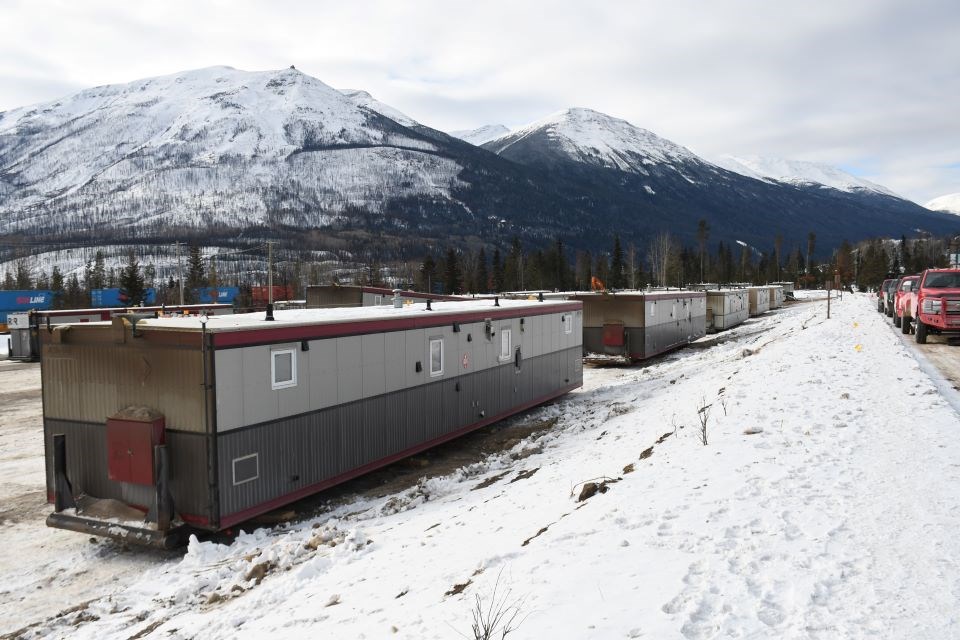Around 120 units of interim housing have been delivered to the town of Jasper as of Friday (Feb. 14) with initial occupancy expected between Feb. 24-26.
Logan Ireland, municipal recovery project manager for the Jasper Recovery Coordination Centre (JRCC), said units began arriving in town on Tuesday (Feb. 11).
“It was a very exciting moment for all of us here at the JRCC, and I hope for the community as well, to see a symbol of all the work that’s gone into this and something that can give the community some hope and some reassurance that there are solutions coming,” Ireland said.
Parks Canada is providing 100 duplex trailers and 120 dorm-style units for a total of 320 units to house residents displaced by last summer’s wildfire, which destroyed nearly a third of the town, including 820 housing units.
Over 600 households have applied for interim housing.
The duplex trailers, which are meant for families, will be placed on the four serviced parcels within the townsite. Some of these trailers, along with the dorm-style units, will be placed at Marmot Meadows, adjacent to Whistlers Campground south of town.
While these wellsite trailers were made to be placed in remote areas and come with onboard water tanks and twin propane bullets, the JRCC is accessing the viability of installing more permanent infrastructure in the springtime once the ground thaws.
For at least the next two months, contractors will have to regularly truck in water for the trailers to use. Ireland said while residents would “have a role to play” in conserving water, such as not leaving the tap on, he didn’t believe this would be a big concern.
“In most circumstances, there’ll be ample water,” he added. “People will be able to have hot showers and do their cooking and fill up water bottles and all that kind of thing without too much stress.”
Rent will be $1,000 per month for one side of a duplex trailer or $1,500 for two sides, and one dorm-style unit will cost $500 per month. Residents will begin to occupy units within the townsite by the end of February, while the units at Marmot Meadows will be habitable sometime in March.
Ireland noted the move-in would occur in a phased approach, and priority would go to the 67 households still living in hotel rooms, allowing them to be freed up for visitors.
“It’s a tight timeline that everyone is working collaboratively to get to,” he said. “Things are on track so that the people in town that do need to move in by Feb. 24, units will be ready for them.”
According to the municipality’s website, critical workers will be prioritized when it comes to housing, followed by recovery and rebuild workers. The remainder will go to as many displaced households as possible, and special consideration will be given to families with school-aged children and those who lost housing as a direct result of the wildfire.
As for how many people these 320 units could house, Ireland said the density would be determined based on who accepted the offer for housing.
The Alberta government previously pledged to deliver 250 modular homes by early this year, but because it has insisted on permanent, single-detached units rather than high-density solutions, land negotiations between the province and Parks Canada have since come to a standstill.
Ireland explained space was limited within the town’s boundaries, and officials were striving to utilize the land as effectively as possible.
“With a single-trailer-style layout where we’re only doing one story, we’ve achieved essentially maximum density while providing a good quality of life and ability for infrastructure lines to be run throughout the property,” Ireland said. “We’re very happy with the number of units we’ve been able to fit onto this space.”
The rental contracts for the trailers will last for two years, but officials will monitor how the rebuild progresses.
The JRCC will also continue to explore options to bring more interim housing into Jasper and look at land parcels that have not yet been developed to see if they could be suitable locations for additional housing.
Although Ireland acknowledged these interim housing units were compact, he stated this would allow as many families to be housed as possible.
“I hope that the people moving into them are really happy with them and are grateful that they have arrived in town. I certainly am,” he said. “The bottom line is that they look like they’re going to provide shelter for a lot of people who have not had that guaranteed for too long.”




